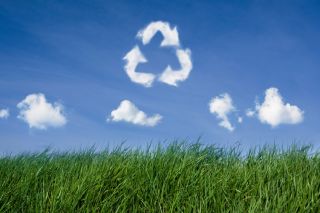Anxiety
Eco-Anxiety and the Symptoms of Going Green
Recycling Meets "Green Stress" Meets Self-Compassion
Posted March 22, 2011

When traveling the country in recent years, my partner and I often encounter hotel rooms that don't have recycling bins. We are pretty thorough recyclers at home, so we find ourselves frustrated over not knowing what to do with the growing mound of water bottles and store receipts. I know, I know, stop buying water! We are pretty much glued to our stainless steel water bottles but, when traveling, buying water is sometimes a necessary evil.
As vacation days fly by and our rental cars look more like blue bins, a moral dilemma turns into full-blown eco-anxiety. Great, something else to worry about- and on vacation of all things. Granted, I know life could be a lot worse if those bags of recycling are our biggest concern. Many of us don't recognize what spoiled lives we lead. And that's what's getting the Earth in such trouble.
Inevitablly, we do find recycling bins at grocery stores so an eco-crisis is pretty much always averted. But, I know that won't be the last I see of my eco-anxiety. After all, I still have pangs of guilt over buying that gas lawnmower six years ago instead of the push mower; and I don't even have a lawn anymore. I'm sorry Earth. I'm sorry I bought that stupid lawnmower!
Arriving home after one memorably eco-challenging vacation, I Googled "eco-anxiety" to see if, perhaps, I wasn't alone in this. It turns out, there a lot of you!
Now, "ecopsychology" was a term I heard years ago in grad school and I've long felt that our connection to the natural environment is an essential one. When we connect to the environment, be it through gardening, walks in the woods, star gazing, or an eco-tour through the Costa Rican rainforest, we gain a primal sense of connection and inner peace. Then in walks eco-anxiety and we've gone from connecting to the environment to worrying that soon there may not be any environment left to connect with.
My Google search that day was prolific. It pulled numerous articles about this real and increasingly common phenomena—this eco-anxiety—of emotional distress stemming from eco-consciousness. (I'll point out that the word "anxiety" in this context is used to characterize an aspect of that distress in a culturally recognizable way rather than be taken in its formal diagnostic sense.) The emotional response could manifest as guilt over forgetting to bring the reusable shopping bags to the grocery store or anger from watching someone toss litter out their window. It could present as sleepless nights thinking about the Great Pacific Ocean Garbage Patch or worrying about the melting polar ice caps. A growing number of people are living with this underlying pervasive worry compounded by an urgency that humans must change—quickly—or it will be too late.
Below I've included links to several articles I found about eco-anxiety, including a 2008 New York Times piece. In that article eco-therapist Linda Buzzell was quoted as saying "Activism can help counteract depression. But if we get caught up in trying to save the world single-handedly, we're just going to burn out." This suggests a more balanced approach and an awareness that we must set limits with our emotional attachment to a cause. We must do the work, but we must be emotionally intelligent about it.
Think of it as caregiver stress on a global scale. We are happier, healthier, and in the long-run better able to contribute more when we stay cognizant of self-care. And, importantly, when we offer ourselves a healthy dose of praise for a job well done and forgiveness when it's not quite perfect. Perhaps we can then shift to a less pathological descriptor: eco-self-compassion?
Check out these other eco-anxiety articles:
New York Times: Eco-anxiety replaces dishpam hands for 'green' moms
Time: It's Inconvenient Being Green
Eco-anxiety: Something Else to Worry About by Justin Nobel
Mother Nature Network: Eco-Anxiety
Updated 4/8/15


